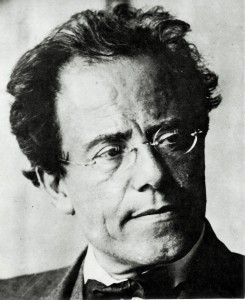When the Eastman Philharmonia and Eastman-Rochester Chorus perform Gustav Mahler’s Symphony No. 2 on Oct. 18, you can be sure it will be an experience like no other.
“Mahler differs from other composers as there is always an element of life versus death, heavenly versus earthly, and an extremely large portion of, yes, total neuroticism, composed into his work,” says Neil Varon, conductor and music director of the Philharmonia.
Born in Bohemia in 1860, Mahler was most well-known during his lifetime as a conductor rather than a composer. Today, however, his music is recognized as a farewell to the Romantic Era.
With sweeping symphonic works calling for orchestra sections twice or even triple the normal size, often along with full choirs and vocal soloists, Mahler’s music is a far cry from that of Beethoven and Brahms. Musicians may find themselves asked to play in unusual ways, and Mahler frequently used descriptive German text to elicit sound effects from various instruments.
One famous example is the command: “Schalltrichter in die Höhe!” (“Horns in the air!”), which results in both an aural and visual spectacle as the French horns, oboes, and clarinets physically raise their instruments while playing.
Mahler’s compositions are defined by “an almost constant wavering between polar attractions,” notes Maestro Varon. “Examples of this [include] the sudden changes of tempi, or the near-banal stage-music entrances.”
“We have such illustrations in just about all his symphonic works. Whether it’s the Jewish wedding quotes à la Klezmer in the ‘First Symphony,’ or the sudden unprovoked più mossi [faster motion] in the ‘Fourth Symphony,’ [Mahler’s pieces] always lead to an unsettled feeling because musical tension is created by styles and tempi which oppose one another. A feeling of being tormented always seems to exist.”
In 1907, just two years before his death, Mahler famously proclaimed, “A symphony must be like the world; it must contain everything.” Though he lived to compose only nine symphonies before falling victim to the “Curse of the Ninth” (Beethoven, Schubert, Dvořák, and Bruckner also died shortly after finishing their respective ninth symphonies), each of Mahler’s works tells a full story, complete with conflict and resolution, love, and death.
Though his symphonies generally last for well over an hour — a bit of a test for the average attention span — they contain all the drama, suspense, and romance of any great book or blockbuster movie, and they are sure to win over even the most determined of classical-music skeptics.
“The Second Symphony,” known simply as “Mahler 2,” is subtitled “Resurrection” due to its otherworldly beauty and intensity. Mahler likely drew inspiration from the tragic death of his friend in the midst of the symphony’s completion, as well as from his own Jewish spirituality. “It’s a symphony young people love to play,” Maestro Varon explains. “It’s one of [Mahler’s] finest in terms of form. It doesn’t meander or lose its direction, and the musical and even heartfelt religious meaning goes to the core of one’s being. It is truly difficult not to be emotionally touched by this work.”
Asked to describe Mahler 2 in a single word, Phil-harmonia musicians shared their thoughts on the symphony. “Chilling,” said junior Eleanor Lee, cello. “Passionate,” senior and French hornist Emily Browne said. “Supernatural,” said junior Matt Gregoire, bassoon. “Astronomical,” said senior Charlotte Roth, flute.
“If I had to describe Mahler’s ‘Second Symphony’ in one word,” explained junior Jacy Ripley, trumpet, “I would just have to say that it’s awesome. But it’s not just awesome to play; it’s awesome to listen to. ‘Mahler 2’ is my favorite piece of all time, and it’s an honor to get to perform it with the Eastman Phil.”
Come experience the awesome on Friday, Oct. 18 at 8 p.m., in Kodak Hall at Eastman Theatre. Admission is free.
Gordon is a member of the class of 2015.



